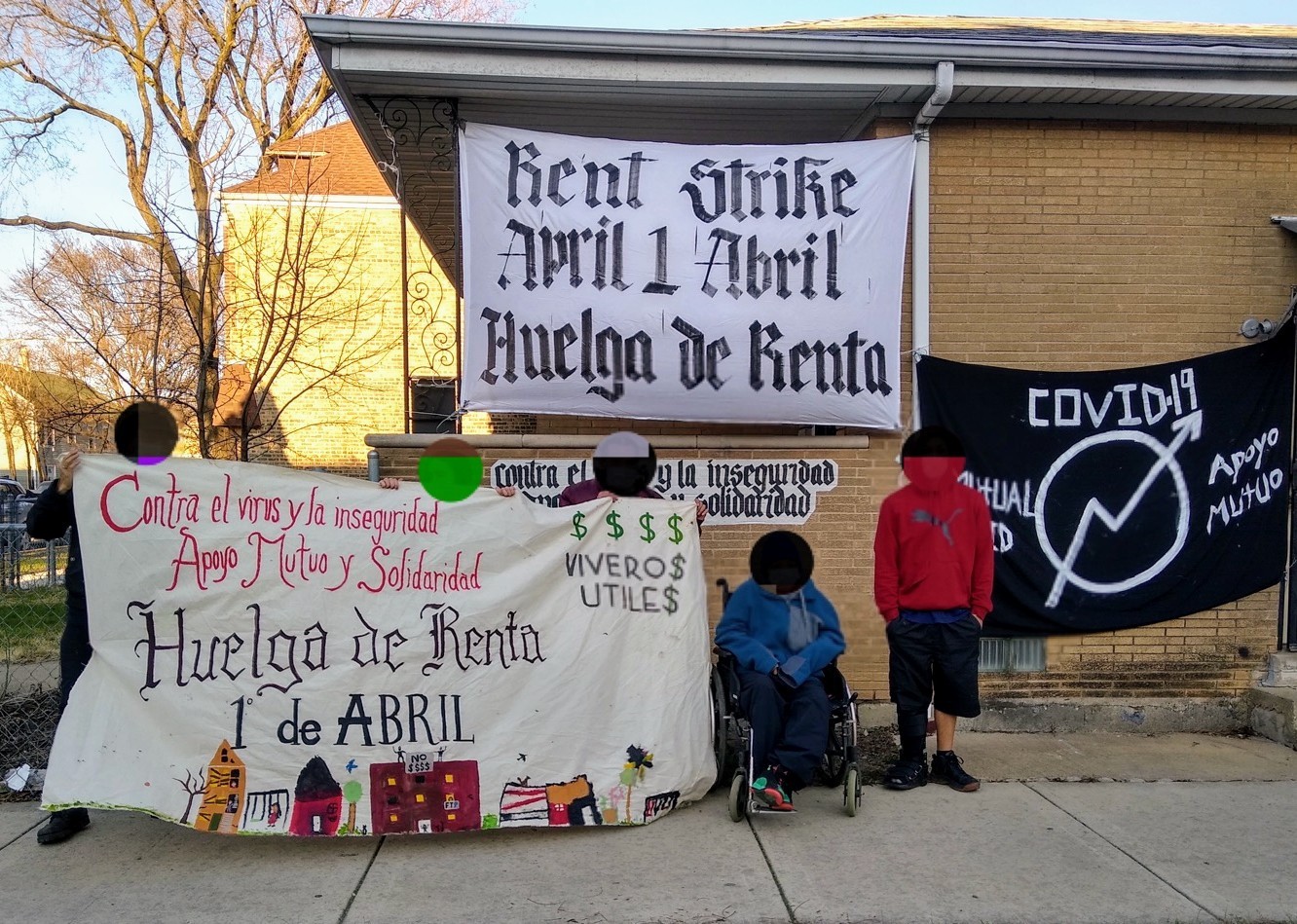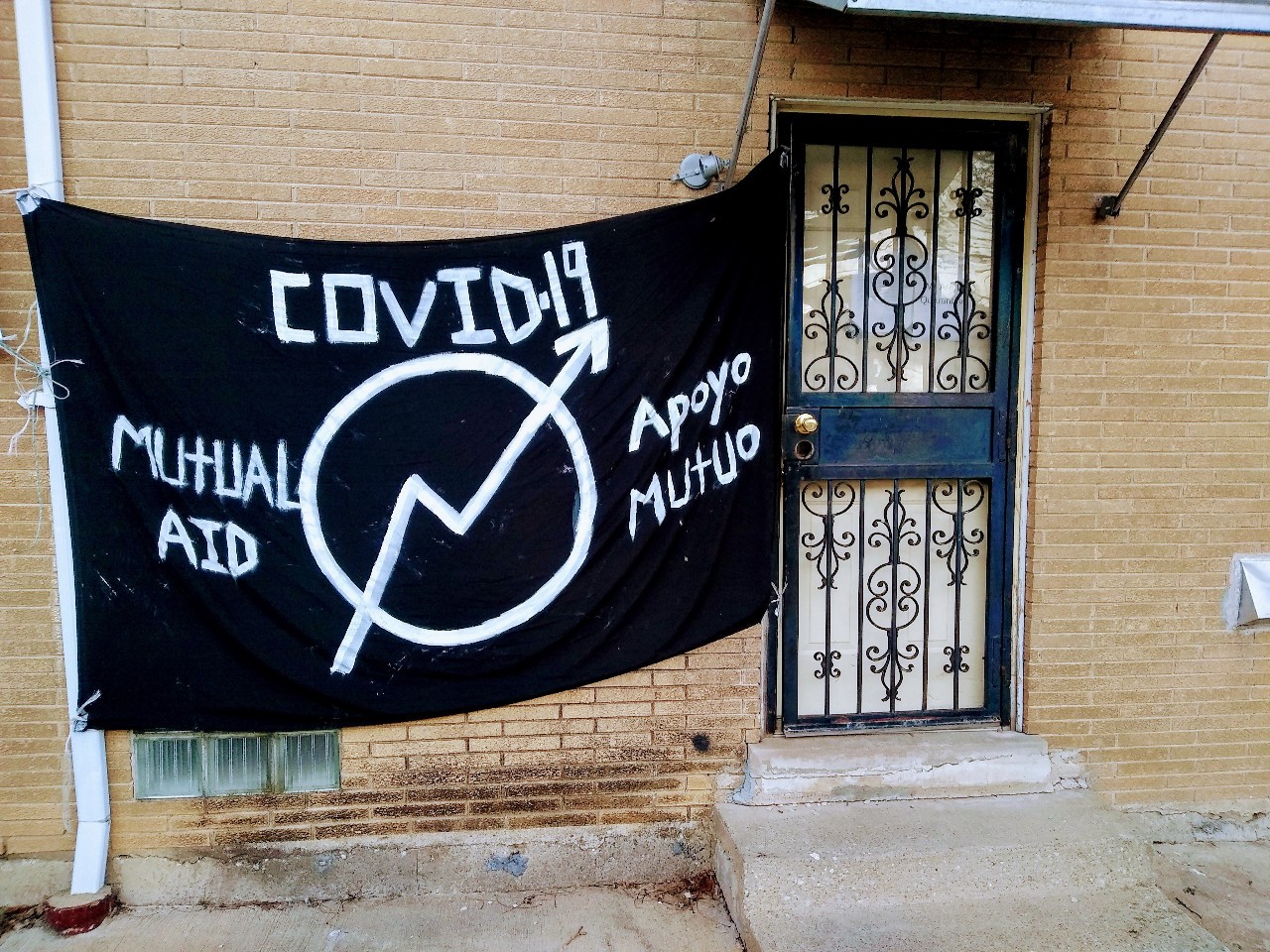Filed under: Action, Anarchist Movement, Community Organizing, Housing, Midwest

Report from Chicago, Illinois on recent occupation of banked-owned property that was turned into a hub for mutual aid efforts.
On April 1st, a group of rent strikers, residents of tent cities and community members reclaimed a building owned by Deutsche Bank in Chicago’s Brighton Park neighborhood to house people experiencing homelessness. In light of the current pandemic and deepening economic crisis, we decided to take matters into our own hands; removing locks and dropping banners to announce our mutual aid efforts. When ‘shelter in place’ decrees are issued, those of us with nowhere to go must defy state-imposed curfews to collectively meet our needs. Together we are creating alternative models for survival in the face of widespread infection, uncertainty and social isolation.
Building on the momentum of ongoing rent strikes, we are renewing calls of solidarity to open up unoccupied homes for those who need them. In cities with eviction moratoriums, the closing of civil courts and the halting of business as usual makes squatting easier than ever before. Just as there is strength in defying the authority of landlords en masse there is transformative power in reclaiming shuttered buildings, clogging eviction bureaucracies, and moving evicted tenants back into their apartments. One is the natural outgrowth of the other. As rent strikes unmask the fundamental violence of rent, building occupations become acts of self-determination that shatter the illusion of private property.
While state responses to COVID-19 continue to center on social distancing, quarantine and public health, we accept these frameworks as cynical half-truths. Although we recognize the dangers posed by the virus itself, we are also keenly aware of the catastrophic effects of viewing ourselves as a ‘population in need of state intervention.’ Even before the current economic meltdown, Chicago has a long history of throwing people onto the streets, systematically denying them access to basic needs and using them as laboratories for social experiments. Over 80,000 Chicagoans experience homelessness every year while only 22,000 are served by the city’s shelters. For us, the calculus is clear: we live in a city engineered from the ground up to cyclically dispose of people like us. This is not incidental or a matter of misplaced priorities; it reveals the true genocidal character of a society where a vast inventory of homes, owned by investment firms and multinational banks, are kept vacant and inaccessible while the rest of us scramble to stay alive. At the same time, affordable housing continues to be miserably funded and much of Chicago Housing Authority’s buildings are laying empty during this global pandemic.
This is why we refuse to become self-congratulatory in quarantining at home or to assume the role of onlookers as our neighbors are left to fend for themselves.
Likewise, when Governor of Illinois and liberal darling, J.B. Pritzker instructs us to find refuge in homeless shelters, as he has done consistently throughout the crisis, his canned smile belies the fact that agencies are not only turning people away but kicking people out due to new social distancing protocols. In classic neoliberal form, Mayor Lori Lightfoot has offered to rent hotel rooms for temporary quarantine, a proposal rooted in the same tortured logic responsible for the housing crisis in the first place – protecting the interests of real-estate firms, propping up the hotel industry and using police to sweep the parks and dismantle encampments.
Nothing about the state’s current management strategy looks like the gains of a social movement to us; the hold on evictions, the spectacle of concern, the incessant talk of civic virtue. With every concession given by the City of Chicago, Cook County or the State of Illinois, with every dollar of the federal government’s aid package or the mayor’s rent assistance program, comes a silent bribe meant to obscure what is fundamentally at stake; adherence to a structure of dependence aimed at stifling our capacity for self-organization. They want us to compete in a survival lottery, to remain atomized, bereft of connection except through the appropriate channels, motivated by self-preservation and cowering in fear of becoming like the ‘less fortunate,’ who live and die on the streets, prison camps, detention centers, along migration routes, and in rapidly declining health facilities and nursing homes.
This is why we refuse to become self-congratulatory in quarantining at home or to assume the role of onlookers as our neighbors are left to fend for themselves. We refuse to cheer on the mayor’s decision to close down the lakeshore and adjacent parks with no regard for those who need them for a place to sleep. We refuse to moralize the presence of people on the street instead of offering to fight alongside them. We refuse to be rounded up by authorities in the name of ‘public health’ and pushed out of the purview of so-called decent people, who only now, circumstantially, sympathetically, are facing the reality of failing to pay rent.
Instead, we hope that the homes we reclaim will become hubs of community support and collective experimentation during this phase of the crisis. In times when demobilization has gained popular support, we come together to find solutions not only beyond but against the city’s culture of death-making. We turn to our communities and mutual aid networks to sink into life, to build and share resources essential for each other’s survival. We urge you to continue doing the same, living with a recognition that this moment of crisis is also a moment of shifting horizons. What was previously unthinkable is suddenly within reach.







